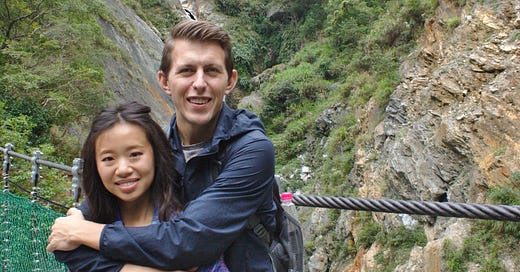#77: Droid 3s, Grad School, Writing & Other Lessons From The 2010s
😎 Reflections on life, work & what matters
December 21st, 2019: Good evening and happy holidays from Taiwan! Some fun personal news: Angie and I got married in October! I thought I’d share a pic of us in Taroko traveling with my mom, aunt and uncle last month 😀

👋 Welcome aboard Roy, Astrid, Cynthia, Matthew, Vethin, Rach, Susan, Matt, Jabi, Stephen, John, Jared & Mike. We're now up to 1,150 people reading the Boundless newsletter!
📩 Forward this to a friend who might get a kick out of it via e-mail or share on twitter🎄 I got a big carried away with a short (turned long) reflection on the 2010s below - I hope you like it. While I managed to make more than I spend again in 2019, I do spend a lot of time working on the Boundless newsletter and Reimagine Work podcast. If you enjoy either and would like to becoming a recurring sponsor or make a one-time gift, you can do so here.
#1 The 2010s
Ten years ago I had a Droid 3 and at the time I thought having a phone with a keyboard was the sensible way to use a phone.

I’ve been wrong about that and many things since.
🏆
Ten years ago I was working at McKinsey and had just submitted my application for grad school at MIT. I went back and read the essays I had written and can feel my own discomfort:
I wish to pursue the Leaders for Global Operations program because it will allow me to share my passion for operations, provide an opportunity to build a career as an operations leader and enable me to expand my business and engineering competence in a rigorous and quantitative academic setting.
Here’s what was actually swirling in my head:
“I don’t know what I want to do when I’m older, but the idea of being able to hang out with curious young people and being able to say I go to a school like MIT is too good an opportunity to pass up. Plus, the generous stipend the program offers is the reason this is the only program I’m applying to. Please accept me, I want a break from work!”
In 2010, I was still living in the future. Focused on the next thing, the next job, the next stamp of approval.
🩺🗽
After business school, I spent three years facing health challenges. As it absorbed my attention and tested me in unexpected ways my identity as a worker felt more like an abstraction.
As I recovered I felt like a different person and as it is clear now, a bit lost. My life trajectory still had all the makings of someone who was following the right path, but inside I was trying to discover and integrate a new reality.
In 2015, I moved to New York and moved in with my college roommate. I wanted to recapture some of the joy of college life.
What I found instead was that many of my friends were ready to get more serious with work and move on with being a grown up.
I wasn’t there yet.
🧳
Mentally, I went full nomad in 2017, but it wasn’t until I moved to Taiwan that people noticed.
I spent most of 2017 and 2018 wandering around New England with flexible gigs that allowed me to work from anywhere and supported a good life.
Along the way, I awakened to a very obvious equation:
more spending = more workReverse engineering this led me to experiments with working less, minimalism and trying to minimize my cost of living.
A lot of the experiments made people uncomfortable and rightly so. Most 32 year-olds who just left jobs paying nearly $200k a year don’t move into a sublet with three other twenty-somethings sharing a single bathroom.
The Buddha said that the root of all suffering is our attachment to how things should be - things we should have and discomfort we should not have to face.
In letting go of many of my own attachments, it taught me that discomfort is okay.
Stepping towards discomfort has brought me more joy than anything else.
🏫
In that house I lived with one of the smartest people I’ve met, let’s call him Mike. He dropped out of a PhD program at Brown a few years earlier, frustrated with the politics and bureaucracy required of such a path.
I thought about pursuing a PhD for the latter half of the decade, but most people in that world advised against it. The Professors I talked to wouldn’t do it again.
I’ve accidentally stumbled into a working prototype of my own version of Academia, but without all the bad stuff. Earlier this year five or six CEOs of consulting talent platforms reached out to me after I wrote an article about the industry - they wanted my advice. Last week I landed a writing gig on twitter which was the result of a fun writing assignment I volunteered for a couple months ago.
Proof-of-work is the new resume and proof-of-insight is the new credential.
However, many people still carry an aversion to sharing and creating in public. We are tortured by ideas handed to us from school and work that things need to be perfect. That you need credentials before you are allowed to create.
When living in that house, I read some of Mike’s writing and it was incredible. It also pained me to read it because I knew that he had enormous creative potential without an outlet to express it.
I want to help people find those outlets.
✍
When I was sick, I started a blog. It was a desperate call for friendship and support and it worked. It also awakened a creative energy inside that I didn’t know existed.
I was reading William Zinsser’s On Writing Well this week and came across this quote:
“There are many good reasons for writing that have nothing to do with being published. Writing is a powerful search mechanism, and one of its satisfactions is to come to terms with your life narrative. Another is to work through some of life’s hardest knocks—loss, grief, illness, addiction, disappointment, failure—and to find understanding and solace.”
Writing helped me grapple with that health challenge but it also has helped me understand who I am. In the book Zinsser challenges the reader to be brave and put themselves out there, to not be afraid of what others might think.
This is perhaps what I’ve attempted here today and the spirit I hope to bring into 2020.
Until then.
#2 Archetypes & The FoW
I watched Venkatesh Rao’s talk from Work Marathon this week and agree with his argument that the “future of work” will only be a reality when the archetypes are solidified much as the “organization man” of the mid 1950s was the point at which the industrial system likely reached a stable point.
He offers six archetypes based on the following two questions:
#1 In a bad situation:
A: I am more likely to leave than complain
B: I am more likely to stay and complain than leave
#2 When stuck, I usually try to get unstuck by:
Thinking about the systems rules
Thinking about the ultimate goals
Thinking about my values
resulting in the following archetypes:
A1: Hacker
A2: Contrarian
A3: Legalist
B1: Investigator
B2: Operator
B3: Holy Warrior
I find this compelling because I seem to have made a move from the B-modes to the A-modes with my jump to gig work and self-employment and have had to embrace a completely different way of looking at work.
The B-modes are largely what happens in corporate america (as Venkat says, the work humans can still do) and it seems more are becoming frustrated with these options and at least testing the waters of shifting to A-mode.
Will be interesting to see how this develops, but I definitely think he is on to something.
The future of work will have arrived once the archetypes have arrived.
#3 The jobs are not alright
Brookings Institute released a report on the state of low-wage work in America. I became concerned with this after doing some work with the Good Jobs Institute a couple years ago and seeing how bad the conditions were for many of these workers. Beyond low wages, many struggle to get enough hours, get their schedule more than a week ahead of time or keep a job if they have to take care of children.

The cutoff nationwide (with some variance for region) was an hourly wage of $16.03. This includes some jobs that even in the past might have nominally paid more (especially when factoring in benefits and pensions) such as construction jobs.

One of the most interesting analyses I’ve read on why wages seem to not have risen comes from Mark Warshawsky who wrote a paper looking at a broader measure - compensation - which includes things like healthcare and other perks. His finding was quite direct:
the rising cost of health care is a major cause of increasing earnings inequality
Low-wage earners have seen increased in compensation, but it has been eaten up by the steadily increasing price of healthcare. Unfortunately, increasing prices has not correlated well with increased value. In fact, with higher deductibles, many likely are getting worse value.
In addition, if you look at low-wage earners, they are married at dramatically lower rates (37.6% of low-wage earners are married, compared with 62% of mid and high wage earners).
Once you dig deeper into this, it highlights a incredibly complex and hard-to-solve problem. Political ideas seem to capture many imaginations, but tend to focus on the total number of jobs or moving money around the same pie.
Work is still the center of how people find dignity and contribute and it seems that many of the jobs we have to deliver on that are not up to par.
That’s all for this week. Have a good weekend!

Want to Support Boundless? All of the options here 👉 If you want to learn more about who I am or what I’m working on, find me here or check out some of my longform writing. If you aren’t subscribed to the e-mail, join us here:




